
Not an End,
But a Beginning:
Thriving After a First Episode of Psychosis
The truth is, a psychosis diagnosis doesn’t mean your life is over. Many people who experience psychosis go on to lead fulfilling and meaningful lives—pursuing careers, education, relationships, and hobbies that bring them joy. Some choose to speak openly about their experiences, while others focus on their passions without making their psychosis a central part of their identity. Here are a few examples of people who have experienced psychosis and continued to live full, meaningful lives.





Setting Goals in All Areas of Life
Recreation
Enjoying life isn’t just about responsibilities—it’s also about having fun, exploring interests, and expressing yourself. Recreation can bring joy, relaxation, and creativity into your life.
• Reconnect with a hobby you used to love, like drawing, writing, or playing music
• Try a new activity, like photography, cooking, or crafting
• Visit a museum, art exhibit, or live performance
• Join a social or hobby-based group to meet people with similar interests
• Purchase supplies for a creative project you’ve been wanting to start
• Spend time outside doing something active, like hiking or biking
Relationships
Relationships can bring support, joy, and connection. Whether you’re looking to build new friendships, reconnect with family, or strengthen existing relationships, there are many ways to foster meaningful connections.
• Make a new friend by joining a club or group that interests you
• Plan a family game or movie night
• Call or text a family member once a week to stay in touch
• Attend a local event, like a book club, volunteer day, or community class
• Reconnect with a friend you lost contact with during a difficult time
• Practice setting healthy boundaries in relationships
Education
Education can open doors, but success looks different for everyone. Whether you’re looking to continue your studies, return to school, or learn new skills, there are many ways to grow academically.
• Improve your grades in a subject that challenges you
• Apply to college, trade school, or a certification program
• Re-enroll in school if you previously had to step away
• Earn your GED or high school diploma
• Seek tutoring or academic support
• Study for the SAT, ACT, or another entrance exam
• Take an online course to learn something new
Vocation
Having a job or career you enjoy can provide independence, confidence, and stability. Whether you’re looking for work, hoping to grow in your current job, or exploring new opportunities, setting goals can help you move forward.
Find a part-time or full-time job that suits your interests and skills
• Self-advocate for accommodations at
work that support your success
• Apply for an internship or volunteer opportunity
• Increase your work hours if you feel ready
• Learn a new skill that can help with career advancement
Physical Health
Taking care of your body can help you feel better physically and mentally. You don’t need to overhaul your routine overnight—small, manageable changes can make a difference.
• Schedule a doctor, dentist, or vision
appointment
• Refill a prescription at the pharmacy
• Exercise once or twice a week in a way that feels enjoyable, like walking, stretching, or dancing
• Add an additional serving of fruits or vegetables to your daily meals
• Stick to a regular bedtime or sleep routine to feel more rested
• Drink enough water throughout the day
Mental Health
Your mental health is just as important as your physical health. Setting mental health goals can help you get the most out of your care.
• Identify coping strategies that help you manage stress or difficult emotions
• Practice self-compassion and challenge negative self-talk
• Keep a journal to track your thoughts and feelings
• Build a daily routine that provides structure and stability
• Try a relaxation technique like deep breathing or mindfulness
• Reach out for support when you need it, whether from a professional or a trusted person in your life
• Create a crisis plan or recovery maintenance plan
Finances
Financial stability can reduce stress and give you more independence. Whether you’re just starting to manage money or looking to build better habits, financial goals can help you feel more secure.
• Create a simple budget to track your income and expenses
• Open a savings account and set a small savings goal
• Apply for a credit card and learn how to use it responsibly
• Pay off a small debt or set up a plan to do so over time
• Research different financial aid options for school or training programs
• Learn about credit scores and how to build good credit
Spirituality
For many people, spirituality or mindfulness practices provide comfort, meaning, and a sense of connection. This can take many forms, and it’s about finding what feels meaningful to you.
• Attend a religious or spiritual gathering in your community if that aligns with your beliefs
• Keep a gratitude or prayer journal to reflect on your thoughts
• Spend time in nature, whether on a walk or just sitting outside
• Try a guided meditation or breathing exercise
• Read a spiritual or philosophical book that interests you
• Join a group that shares your values or beliefs
“People with goals succeed because they know where they're going.”
What Are SMART Goals?
S
Specific
Clearly define what you intend to accomplish
M
Measurable
Measure your progress and success
A
Achievable
Be realistic about your needs and capacities
R
Relevant
Ensure alignment with your values and other goals
T
Time-Bound
Create a deadline or timeline to stay on track
Here’s an Example:
I want to get healthier.
I will exercise for 20 minutes,
three times a week, for the next month.
The goal clearly defines what is being done—exercising—and specifies the duration and frequency. It’s not just about getting healthier; it’s about a concrete action.
This goal can be tracked and measured. You can count the number of times you exercise each week and track the total minutes to ensure you’re meeting your goal.
The goal is realistic. It’s not too ambitious (like aiming to exercise for two hours daily). Exercising for 20 minutes three times a week is a manageable amount of physical activity for most people.
This goal supports the broader objective of improving your health, which can positively impact other areas of your life, such as energy, mood, and overall well-being. Because it is manageable, you can balance it with goals in multiple areas of your life without requiring an excessive or unbalanced time commitment.
The goal has a clear deadline: for the next month. This creates focus and allows for a review after the month to determine if the goal was achieved and whether it needs to be adjusted moving forward.
Create Your Own SMART Goals
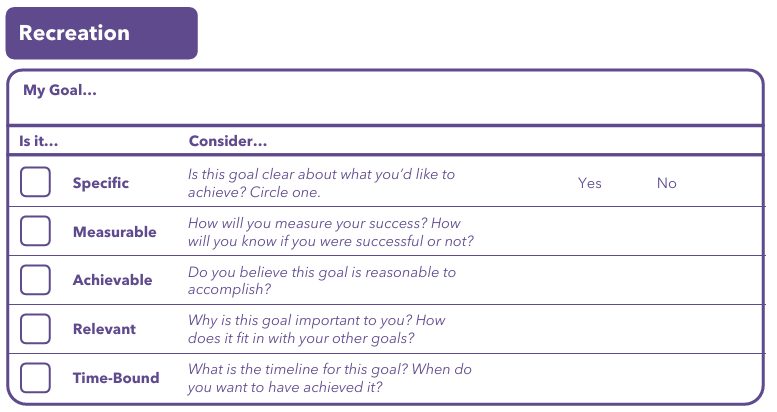
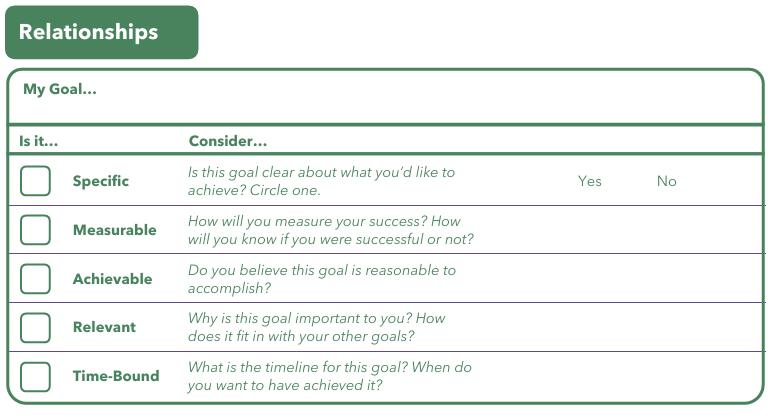
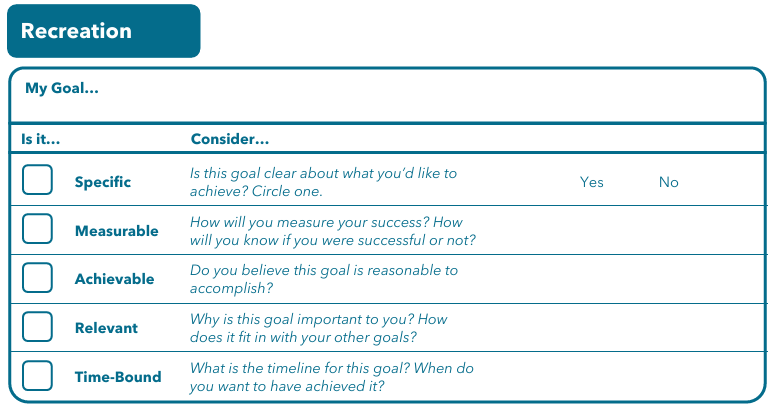
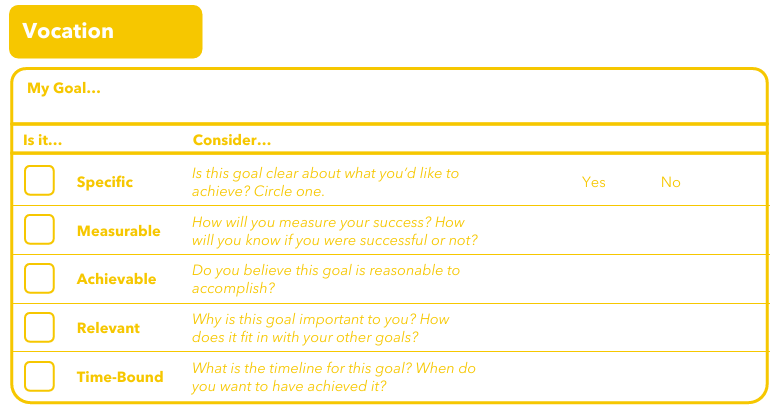
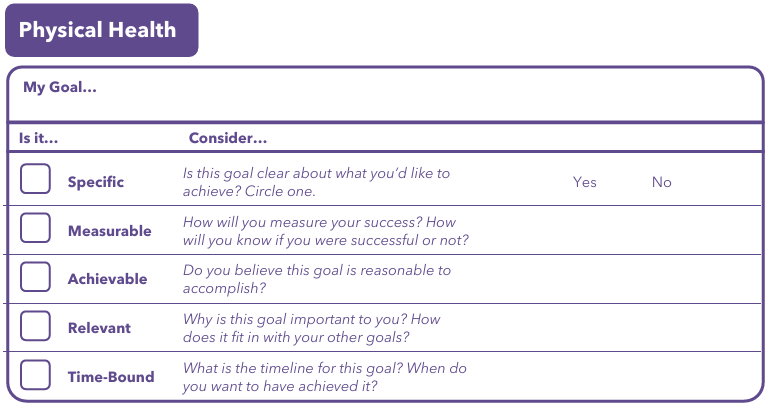
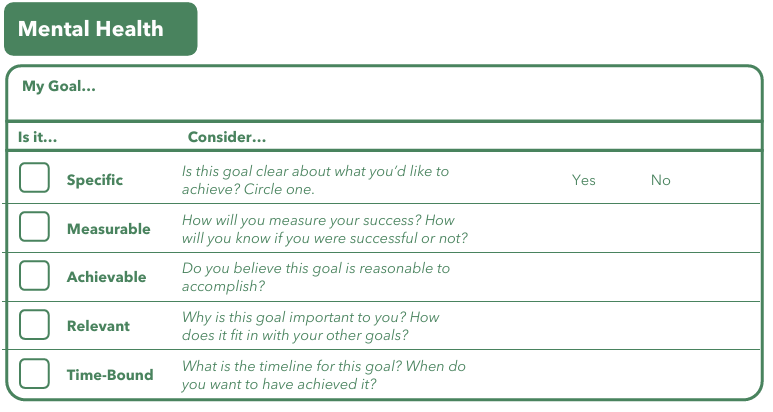
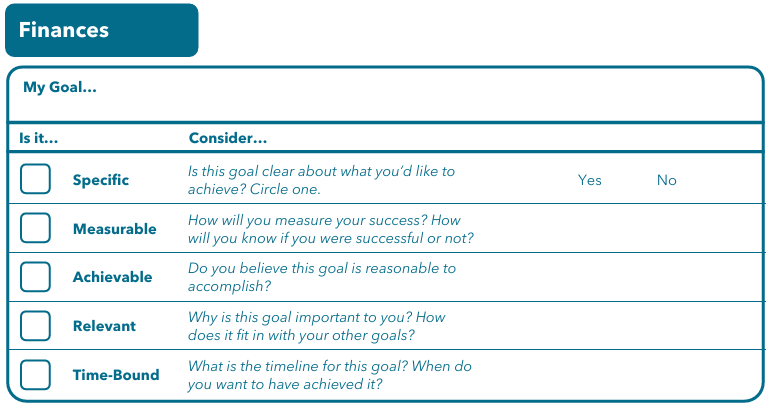
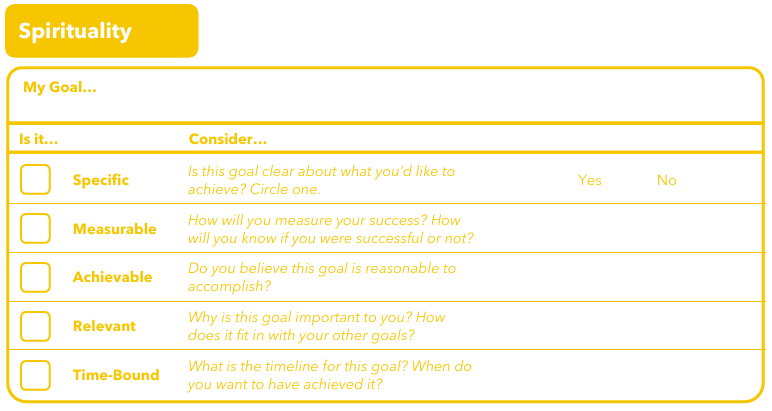
Build Your Team
People You Already Know
- Family and friends
- Peers
- Mentors
- Educators
- Employers
- Mental health and medical professionals
- Community resources
- Faith leaders
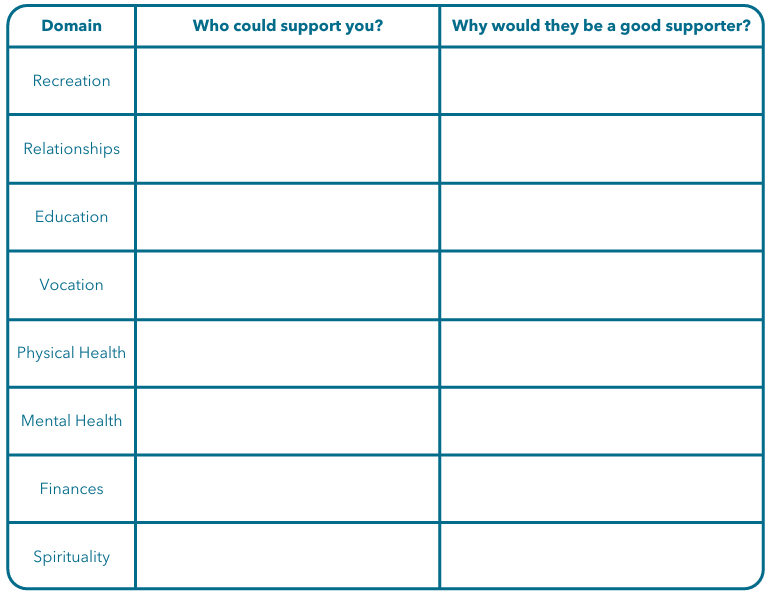
People You Don’t Know Yet
Recreation
Community centers
Hobby clubs
Extracurriculars or adult education classes
Parks and recreation programs
Fun events
Relationships
Support groups
Social meetups
Faith-based groups
LGBTQ+ centers
Academic or professional organizations
Networking events
Education
School counselors
Academic advisors
Tutoring programs
GED prep programs
College admissions offices
Local community colleges
Vocation
Job resource centers or employment agencies
Career advisors
Career fairs
Local libraries
Small businesses
Internship programs
Physical Health
Doctors
Wellness coaches
Health clinics
Community wellness programs
Fitness groups
Dieticians
Mental Health
Therapists
Peer support specialists
Mental health nonprofits
Online support tools and communities
Finances
Financial literacy programs
Nonprofit organizations
Credit unions
Financial advisors
Government assistance programs
Spirituality
Faith-based organizations
Meditation or mindfulness groups
Philosophy discussion groups
Nature retreats
Narrow Down Your List
- Do they have experience or knowledge about what I’m trying to do?
- For instance, if your goal is to apply to college, a teacher, school counselor, or someone who has been through the process might be helpful.
- Are they someone who is supportive and encouraging?
- A helpful person should be someone who believes in you and makes you feel capable, not someone who discourages you.
- Are they reliable and available to help?
- A person might want to help but may not have the time or ability. If they aren’t available, that’s okay—you can look for someone else.
Asking for Help
- Casual Approach
- “Hey [Name], I’m trying to [goal], and I know you have experience with this. Do you have any advice?”
- Direct Ask
- “I’m working on [goal] and could really use some support. Would you be willing to help me figure out my next steps?”
- Connecting to Resources
- “I want to [goal], but I don’t know where to start. Do you know anyone I could talk to or any resources I could check out?”
- Practical Help
- “I need to [task, like practice for an interview or build a budget]. Would you be willing to help me with that?”
- Asking for Accountability
- “I’m trying to stay on track with [goal]. Can I check in with you once a week to let you know how it’s going?”
- Requesting Feedback
- “I put together [project, application, plan]. Could you take a look and let me know if you have any suggestions?”
- Seeking Personal Experiences
- “I know you’ve [done something similar]. What was your experience like? Any advice?”
- Asking for Encouragement
- “I’m feeling nervous about [goal/task]. Can you remind me why I can do this?”
“Asking for help is the first step toward overcoming what you thought was impossible.”
Maintaining Your Support Team
Check in with supporters
Celebrate wins
Gratitude
Building long term connections
- Check in occasionally, even if you don’t need help at the moment
- Offer to help them in return—relationships are about give and take
- Pay it forward by supporting someone else when you’re in a position to help
Make a Plan
Why is a plan important?
Stay Focused
It’s easier to work
toward something when
you know the next steps
Reduce Stress
Breaking a goal into
smaller steps makes it
feel less intimidating
Adapt as Needed
If things don’t go as
planned, structure
makes it easier to adjust
Key Considerations for Your Plan
What resources will you need?
Consider what materials, information, or time commitments are necessary for your goal.
• Do you need any supplies? (e.g., running shoes for an exercise goal, a planner for organizing tasks)
• Do you need information? (e.g., research on college applications, steps to open a savings account)
• How much time will this take? (Will you need to adjust your schedule to fit this in?)
Who do you need to talk to?
Some goals require outside help or advice. Think about:
• Who can offer guidance? (e.g., a mentor, teacher, therapist, job coach)
• How will you contact them? (e.g., email, phone call, setting up an appointment)
What skills will be involved?
Some goals require new skills or habits. Consider:
• Do you already have the skills you need?
• If not, how can you develop them? (e.g., taking a class, practicing, asking someone for help)
Accountability
- Set a Timeline: Decide on a reasonable timeframe and set deadlines for each step.
- Check in With a Support Person: Ask somebody to check in on your progress regularly.
- Write it Down: Keep a record to track your progress, questions, and challenges you run into.
- Reward Yourself: Celebrate progress, even small wins!
“Failing to plan is planning to fail”
Breaking Your Goal into Steps
Each step should be small enough that you know exactly what to do next. There’s no such thing as “too small”. If you need, they can be as little as…
1.) Open laptop
2.) Open email inbox
3.) Click ‘New Message’
For Example
If your goal is to apply to a certification program at a local trade school, your plan might look like this:
1. Draft a list of questions I have about the application process
2. Research online to see if I can answer any of them myself
3. Discover the name of the admissions officer at my chosen school if I still have questions
4. Draft an email with my questions
5. Ask a mentor to review my email and provide feedback
6. Revise the email based on their suggestions
7. Send the email to the admissions officer
8. Determine my next steps with my support team based on the response I receive
Recognizing Your Strengths
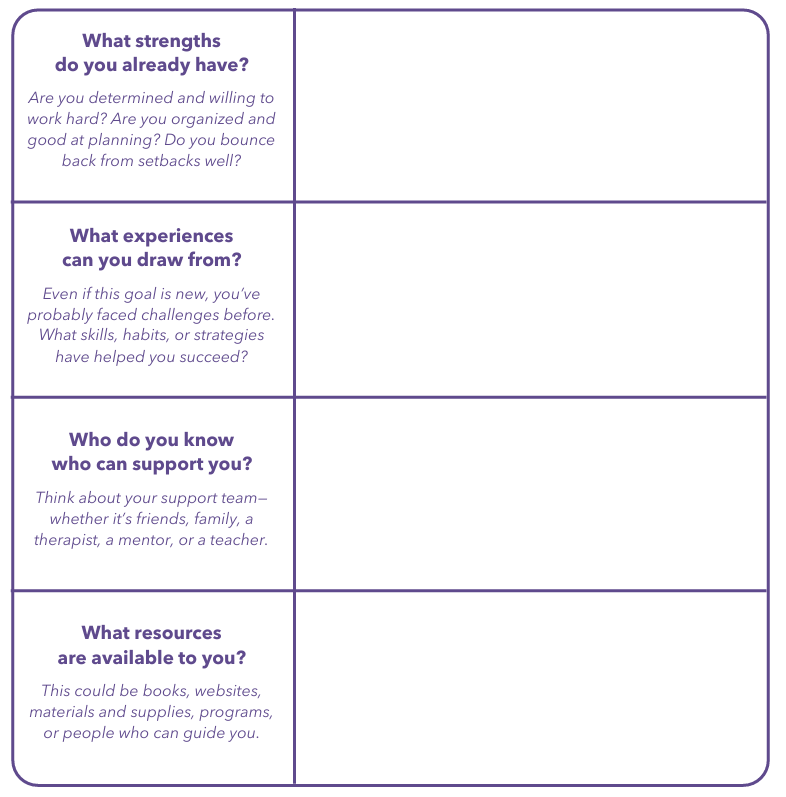
Getting Ahead of Challenges
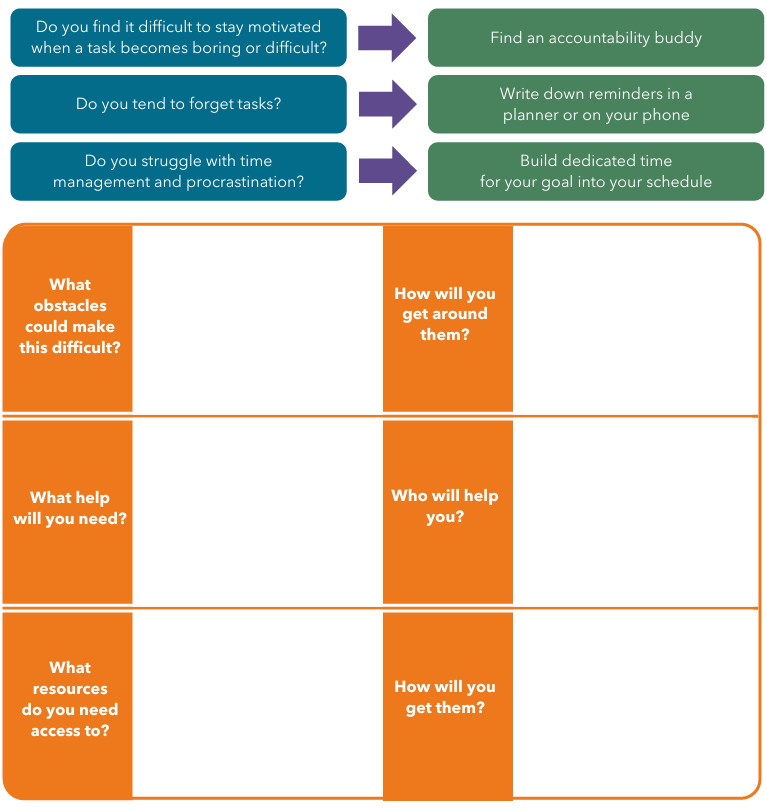
Troubleshooting
Even with the best plans, difficulties can come up along the way. Instead of giving up when something doesn’t go as expected, troubleshooting helps you adjust your approach so you can keep moving forward. Some obstacles might be small, like forgetting to do a task, or bigger, like realizing you need more support than you thought. Either way, making a plan to work around the issue will help you stay on track. If you need help with troubleshooting, don’t hesitate to reach out to your support team! We all run into trouble sometimes, and there’s no shame in asking for assistance.
Identify the Problem
- What exactly is the problem? Be as specific as possible.
- When did this issue start? Did something change that made it harder?
- What’s making this difficult? Are there outside barriers (time, money, resources) or personal challenges (motivation, stress, energy levels) involved?
- Have I faced a similar challenge before? What worked (or didn’t work) last time?
For Example
You planned to practice playing piano three times a week, but you keep skipping your sessions. Instead of saying, “I’m just bad at sticking to things,” try breaking it down. Are you too tired after work? Do you forget? Are you not enjoying playing piano?
Modify the Goal if Needed
- Start Smaller: If your goal feels overwhelming, break it down into an even smaller first step.
- Example: Instead of “Apply to 10 jobs this week,” start with “Revise my resume today.”
- Try a New Approach: If the first method isn’t working, consider other ways to reach your goal.
- Example: If you joined a soccer team to make friends but realized you don’t enjoy it, try a book club or a volunteer group instead.
- Change the Timeline: Maybe your original timeframe was ambitious, and you need to scale back .
- Example: Instead of “Save $500 in one month,” try “Save $500 in three months.”
- Focus on Progress, Not Perfection: Even if you don’t fully meet your goal, any progress is valuable. Reframe setbacks as learning experiences instead of failures.
- Example: If your goal was to cook dinner five nights a week but you only managed three, that’s still a big step forward!
Consider Whether You Want to Stick to This Goal
- Why did this goal matter to me in the first place? Does it still matter now?
- Am I pursuing this goal for myself, or because I feel like I "should"?
- Is there a different way I could meet the same need?
Reflect Back
Identify the Problem
Reaching the end of a goal, whether you succeeded exactly as planned or had to adjust along the way, is a valuable opportunity to learn. Reflection helps you recognize your progress, celebrate your efforts, and figure out what worked (and what didn’t). It’s not about judging yourself; it’s about understanding your journey and using what you’ve learned to keep moving forward.
Determining Whether You Succeeded
Before you decide if your goal was a success, take a moment to define what that looks like for you. Maybe you set a goal to find a part-time job, but you haven’t landed one yet. However, you improved your resume, applied to multiple places, and gained confidence in job interviews. Even if you didn’t fully reach your original goal, you still learned and grew.
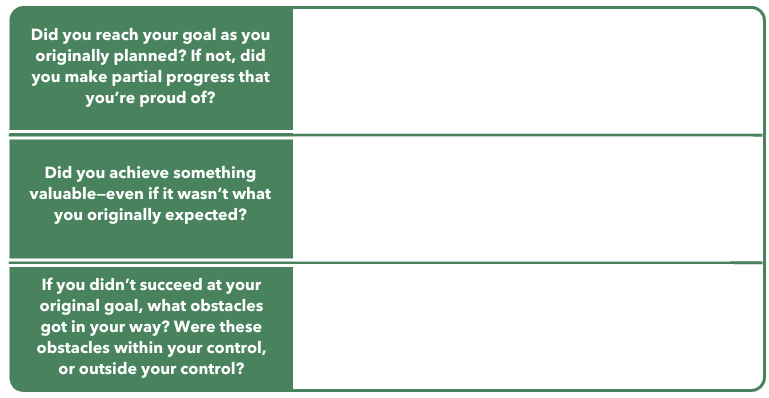
“Shoot for the moon. Even if you miss, you’ll land among the stars.”
Feelings
Cost/Benefit Analysis

What Was Helpful in the Process of Working on Your Goal?

What Was Helpful in the Process of Working on Your Goal?
Every goal—even the ones we don’t fully complete—teaches us something. This might be about the domain (such as building better financial literacy), yourself (maybe you discovered a love for cooking), and/or goal-setting in general (for example, if you struggled with motivation because your goal was too vague, next time you’ll know to make it more specific and time-bound).
Balance

Persistence
Set a New Goal
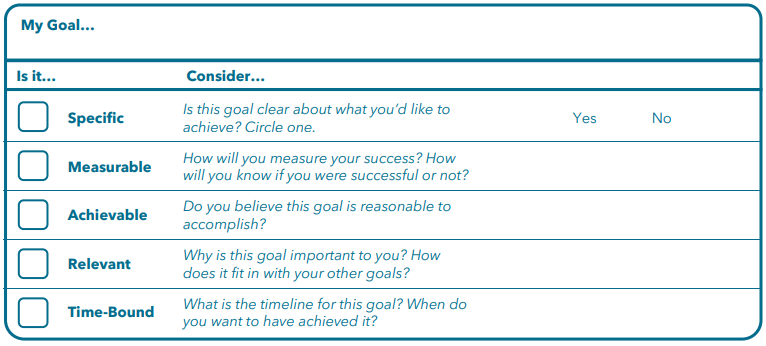
More Resources
Receiving a diagnosis of psychosis can feel overwhelming, but you are not alone. Many people have walked this path before and found support, stability, and fulfillment in their lives. This workbook has provided tools to help you set goals, advocate for yourself, and navigate your journey. However, no one
does it all on their own—there are many organizations, communities, and resources available to help. Below are some places where you can find support, education, and connection as you continue moving forward.
Missouri Early Psychosis Care Center
www.epcmissouri.org
Missouri Early Psychosis Care (EPC) is dedicated to improving the lives of young people experiencing psychosis. EPC connects individuals and families to specialized early intervention services, ensuring that people experiencing first-episode psychosis get the best possible care. If you’re looking for guidance on treatment options, understanding your diagnosis, or accessing support in Missouri, EPC is a great place to start.
EPC Youth Advisory Council (YAC)
www.epcmissouri.org/youth-advisorycouncil
The EPC Youth Advisory Council (YAC) is a group of young people with lived experience of psychosis who work to reduce stigma, raise awareness, and improve access to care. This workbook was created by YAC to help others who are newly diagnosed. If you’re looking to connect with peers, share your experiences, or advocate for better mental health care, consider getting involved with YAC.
LifeLaunch
www.lifelaunchmo.org
LifeLaunch is a free online resource hub which helps young people in Missouri build the skills they need to navigate adulthood. Their programs provide support with education, employment, independent living, and overall well-being, empowering youth like you to achieve your goals and thrive in your community.
Strong 365
www.strong365.org
Strong 365 provides peer support, resources, and guidance for young people experiencing early psychosis. Their goal is to reduce stigma, encourage hope, and connect individuals to the right care as early as possible. They also offer an online peer chat service where you can talk to someone who understands what you’re going through.
Students With Psychosis
www.studentswithpsychosis.org
This global nonprofit provides peer support, community events, leadership opportunities, and advocacy programs for students and young adults with psychosis.
National Alliance on Mental Illness
(NAMI) Young Adult Programs
www.nami.org/Your-Journey/KidsTeens-and-Young-Adults
NAMI offers education, peer support, and advocacy for individuals with mental health conditions. Their NAMI On Campus program helps college students build supportive communities, and their peer support groups can help you connect with others who share similar experiences.
Schizophrenia & Psychosis Action Alliance
www.szaction.org
The Schizophrenia & Psychosis Action Alliance is dedicated to improving outcomes for people affected by psychosis through advocacy, education, and support. They offer peer-led programs, research initiatives, and policy efforts to drive change and ensure better access to care.
Hearing Voices Network USA
www.hearingvoicesusa.org
If you experience voices, visions, or other unusual perceptions, this network offers support groups and resources to help you explore your experiences in a non-judgmental, peer-led environment.
HeadsUP
www.headsup-pa.org
HeadsUP is a Pennsylvania-based initiative that empowers young people experiencing psychosis through education, peer support,
and advocacy. They provide resources to help individuals and families understand psychosis and connect with compassionate, recoveryfocused care.
